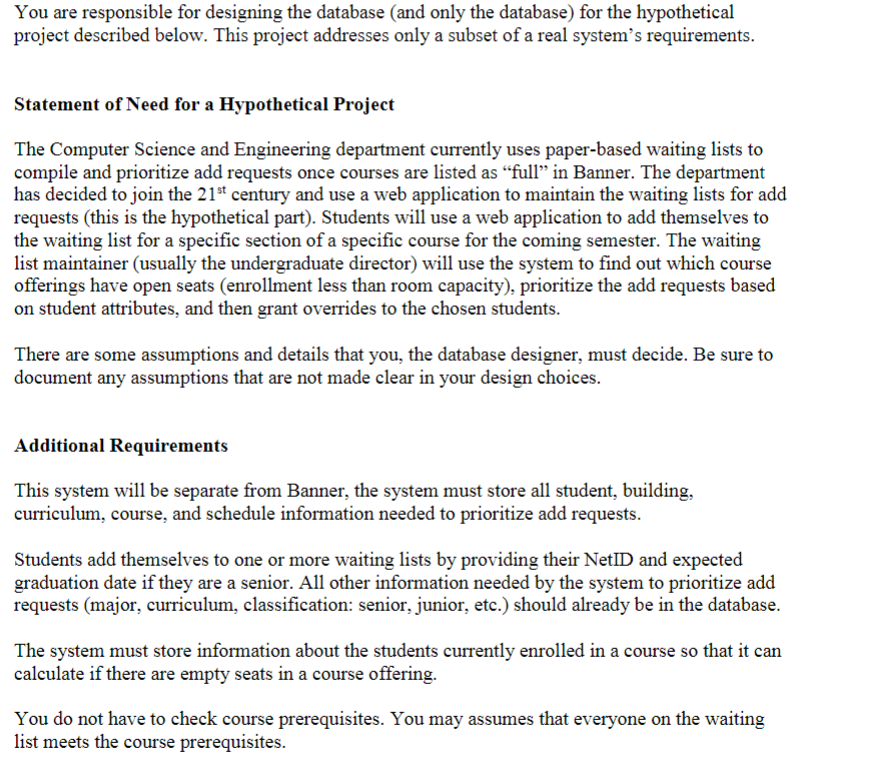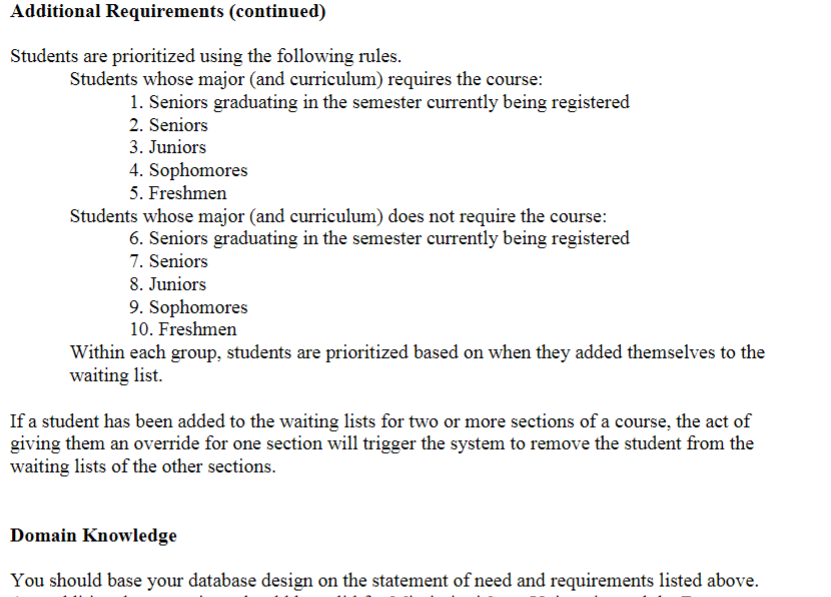Answered step by step
Verified Expert Solution
Question
1 Approved Answer
Create an E.R Diagram (Relational Database) given the information please! You are responsible for designing the database (and only the database) for the hypothetical project


Create an E.R Diagram (Relational Database) given the information please!
You are responsible for designing the database (and only the database) for the hypothetical project described below. This project addresses only a subset of a real system's requirements Statement of Need for a Hypothetical Projedt The Computer Science and Engineering department currently uses paper-based waiting lists t compile and prioritize add requests once courses are listed as "full" in Banner. The department has decided to join the 21st century and use a web application to maintain the waiting lists for add requests (this is the hypothetical part). Students will use a web application to add themselves to the waiting list for a specific section of a specific course for the coming semester. The waiting list maintainer (usually the undergraduate director) will use the system to find out which course offerings have open seats (enrollment less than room capacity), prioritize the add requests based on student attributes, and then grant overrides to the chosen students. There are some assumptions and details that you, the database designer, must decide. Be sure to document any assumptions that are not made clear in your design choices Additional Requirements This system will be separate from Banner, the system must store all student, building, curriculum, course, and schedule information needed to prioritize add requests Students add themselves to one or more waiting lists by providing their NetID and expected graduation date if they are a senior. All other information needed by the system to prioritize add requests (major, curriculum, classification: senior, junior, etc.) should already be in the database The system must store information about the students currently enrolled in a course so that it calculate if there are empty seats in a course offering. can You do not have to check course prerequisites. You may assumes that everyone on the waiting list meets the course prerequisites. Additional Requirements (continued) Students are prioritized using the following rules Students whose major (and curriculum) requires the course 1. Seniors graduating in the semester currently being registered 2. Seniors 3. Juniors 4. Sophomores 5. Freshmen Students whose major (and curriculum) does not require the course 6. Seniors graduating in the semester currently being registered 7. Seniors 8. Juniors 9. Sophomores 10. Freshmen Within each group, students are prioritized based on when they added themselves to the waiting list. If a student has been added to the waiting lists for two or more sections of a course, the act of giving them an override for one section will trigger the system to remove the student from the waiting lists of the other sections Domain Knowledge You should base your database design on the statement of need and requirements listed above You are responsible for designing the database (and only the database) for the hypothetical project described below. This project addresses only a subset of a real system's requirements Statement of Need for a Hypothetical Projedt The Computer Science and Engineering department currently uses paper-based waiting lists t compile and prioritize add requests once courses are listed as "full" in Banner. The department has decided to join the 21st century and use a web application to maintain the waiting lists for add requests (this is the hypothetical part). Students will use a web application to add themselves to the waiting list for a specific section of a specific course for the coming semester. The waiting list maintainer (usually the undergraduate director) will use the system to find out which course offerings have open seats (enrollment less than room capacity), prioritize the add requests based on student attributes, and then grant overrides to the chosen students. There are some assumptions and details that you, the database designer, must decide. Be sure to document any assumptions that are not made clear in your design choices Additional Requirements This system will be separate from Banner, the system must store all student, building, curriculum, course, and schedule information needed to prioritize add requests Students add themselves to one or more waiting lists by providing their NetID and expected graduation date if they are a senior. All other information needed by the system to prioritize add requests (major, curriculum, classification: senior, junior, etc.) should already be in the database The system must store information about the students currently enrolled in a course so that it calculate if there are empty seats in a course offering. can You do not have to check course prerequisites. You may assumes that everyone on the waiting list meets the course prerequisites. Additional Requirements (continued) Students are prioritized using the following rules Students whose major (and curriculum) requires the course 1. Seniors graduating in the semester currently being registered 2. Seniors 3. Juniors 4. Sophomores 5. Freshmen Students whose major (and curriculum) does not require the course 6. Seniors graduating in the semester currently being registered 7. Seniors 8. Juniors 9. Sophomores 10. Freshmen Within each group, students are prioritized based on when they added themselves to the waiting list. If a student has been added to the waiting lists for two or more sections of a course, the act of giving them an override for one section will trigger the system to remove the student from the waiting lists of the other sections Domain Knowledge You should base your database design on the statement of need and requirements listed aboveStep by Step Solution
There are 3 Steps involved in it
Step: 1

Get Instant Access to Expert-Tailored Solutions
See step-by-step solutions with expert insights and AI powered tools for academic success
Step: 2

Step: 3

Ace Your Homework with AI
Get the answers you need in no time with our AI-driven, step-by-step assistance
Get Started


